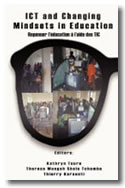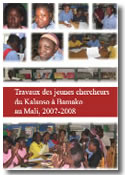Book review: Royalty and Politics May 16, 2010
by Fo Angwafo III and published by Langaa, 2009; reviewed by Kathryn Toure in 2010. “I am what my father was not, but I clearly couldn’t have been without what my father was.”
At the age of 84, the 20th Fon or King of Mankon – in north western Cameroon – relates in 70 pages his life from colonial times to tending the palace and treats us to another 70 pages of “My life in photos” – from the young prince to awards and recognitions.From the telling, the listener learns what it takes to lead, build community, and shape the future. Threads of thinking on land, culture, agriculture and education run throughout the text, leading to lessons in rooting, opening, and growing.
The story begins with Anye, who went to primary school under missionaries and took the civil service exam with an option in agriculture, before addressing broader questions of community and national development. Anye worked as a record keeper “travelling to all the farms in and around Buea… I was in the office keeping records, and out in the farms seeing the plots, and seeing the people…” (p. 10). Once he received his Senior Cambridge Secondary School certificate and was to be transferred to the School of Agricultural Techniques in Ibadan, Nigeria, his co-workers said, “Why you no been tell we say na so you know the book?” (p. 10). In 1951, he attended the Ibadan School of Agriculture, and – imbibed with a love for the land and for self-reliance – just as he had grown tomatoes and cabbages when in primary school, he did numerous small jobs to earn money to buy books and cover other expenses.
One would think that the one having been away from home for so long might be forgotten when it comes to local governance. But the big surprise came when Anye went home to solicit the name for his third child and was asked to be king. Despite his desire to return to his work, he had no choice, in the hands of his mothers. At the age of 34, he was confirmed Fo Mankon and began his journey from Solomon Anye to Fo Angwafo III. The elders appreciated their new king, steeped in tradition and the ways of the land and also exposed to ideas from school, visiting scholars who traveled to Mankon, and people from various backgrounds who settled and did business in Mankon. His abilities to marry the best of multiple worlds appealed to the elders.
Having just been initiated into royalty, it did not take long for Fo Angwafo III to venture into politics, where he served for 25 years. He was elected into the Cameroon House of Assembly and later the National Assembly, serving until retirement in 1988. Criticised for assuming incompatible roles, Fo Angwafo “refused to subscribe to the dichotomy between Fon and politician” (p. 29) and led a life in which he traveled between and linked traditional authority and the modern state.
In his turn, he criticised those who rushed rather than thinking development through and insisted that “[w]e should study our traditional institutions side-by-side with the imported system we are trying to implement” (p. 40). He argues that chiefs would have been relegated to tokenism and auxiliaries of the administration had they not taken things into their hands. And he implores other chiefs to negotiate and evolve their positions so as to be relevant to modern political processes. He asks, “If chieftaincy was that incompatible with modern politics and bureaucratic state power, why then should they so desperately need recognition through traditional titles?”, and gives the example of the title of “Fon of Fons” conferred upon President Paul Biya (p. 41).
The place of education and of land in this autobiography, as mentioned earlier, is prominent. According to Fo Angwafo:
[E]ducation is the key to any meaningful achievement… Although education necessarily comes with new values, I believe that a thorough grounding in our own ways best prepares us to adapt the values we adopt through education… Only by producing something does the degree become a meaningful achievement… Our education must reinforce rather than diminish our humanity and community spirit. It must yield togetherness, not individualism. (pp. 52, 63 and 65)
Land also is “central to everything” (p. 59). Fons are known for catering for education and the interest of the community by having donated land for the first schools in Cameroon. Royal lands were given in trust, to be harnessed, not owned. Fo Mankon explains the need, even in evolving to a system of land ownership, to ensure that land be used for community empowerment. This may be achieved for example by ensuring that Fons as cultural authorities continue to serve on school boards. The “ability to negotiate as a collectivity is tied to a certain authority over land” (p. 54), which should not be relinquished. Land should not be given up but handed over as a cultural resource to be judiciously used in the interest of the collectivity.
Fo Angwafo III is seeking to put science and research at the doorstep of Mankon’s children and grandchildren through a university and to “enrich our culture though encounters with others” (p. 68). In running the kingdom, he decided to keep Mankon culture across and crossing borders and far from home close to home and to facilitate “feeding from and into developments at home” (p. 60) through written memorandum and two visits to the United States in the 21st century.
What will become of kings – chiefs or Fons? What of the worlds of Palace and Parliament? Are they separable, incompatible, overlapping, intertwined, intertwine-able? Do Fons have a role in collective approaches to claiming national power and resources? What will be their role in supporting movements toward larger scale communities and unions, knowing that “big unions can only function to the extent that they are well grounded in the various localities which constitute them?” (p.44). Answers will be found in reading and foreseeing, in adopting and adapting, in dialoguing and making choices about the shape of things to come. The future is to be found as much in the rear-view mirror as is in the encounters in the journeys of life, so we learn from Anye, Fo Angwafo III of Mankon.
[ Download ]



Leave a Reply